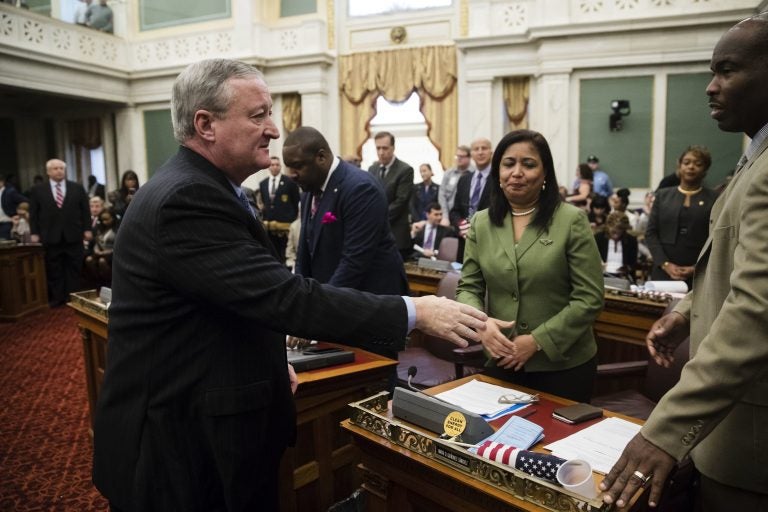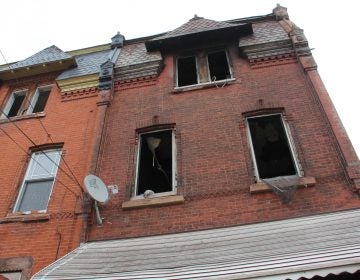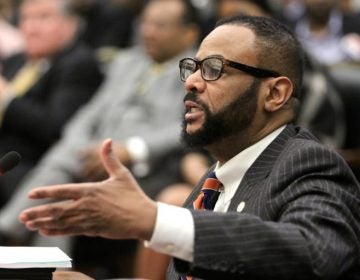City Council is back from summer break. Day 1 ended with Kenney promising money for housing.
The administration and Council came to an agreement to officially kill the 1 percent construction tax.

Philadelphia Mayor Jim Kenney shakes hands with members of City Council after speaking at City Hall in Philadelphia, Thursday, Nov. 2, 2017. (Matt Rourke/AP Photo)
Negotiations between City Council and Mayor Jim Kenney on new affordable housing funding concluded Thursday morning as the administration and the legislative body came to an agreement to officially kill the 1 percent construction tax passed by the council in the spring in exchange for a promise that Kenney will earmark as much as $71 million over five years for building and preserving homes.
The deal means that Kenney will not have to use his veto power to stop the controversial proposed tax on construction and instead, City Council President Darrell Clarke and his allies on the council will withdraw it. The veto would have been his first, and the move against the affordable housing funding scheme may have alienated voters hungry to see the mayor respond to a growing affordability crisis. The Democratic primary for mayor is less than nine months away.
In a show of joint intention at Thursday’s meeting, which was the first after a summer recess, a transfer ordinance to move more than $21 million into the Housing Trust fund was introduced.
“I am pleased to have reached a resolution with all of our colleagues in City Council on a proposal that significantly increases funding for affordable housing without imposing a new tax on construction,” said Kenney in a statement. “All of us share the same goal — ensuring that residents have access to housing options no matter what their financial situation. This new revenue will be a reliable way to achieve that goal.”
As part of the deal, Councilwoman Maria Quiñones-Sanchez’s voluntary inclusionary zoning bill will be recalled as well. The recall will allow the legislation to be amended, keeping alive the bold policy proposal that jumpstarted the city’s move to allocate more money for affordable housing. The forthcoming voluntary inclusionary bill is expected to encourage developers to pay more money into the housing trust fund in exchange for height and density bonuses. Under the tweaked legislation, developers will have to pay between $25 and $30 per square foot to take advantage of the boosted building allowances — a change from the language in the old bill that required payments between 1 and 2 percent of construction costs.
But administration officials cautioned that the $71 million target over five years is a best-case scenario based on a projection that the city will get about $18 million from developers taking advantage of the zoning bonuses. Another $53 million will come from the city’s general fund, as the Kenney administration proposed on Wednesday. That $53 million is guaranteed even if less money comes in through zoning bonuses, officials said on Thursday, stressing that $71 million was a ceiling not a guarantee.
Clarke disagrees and describes the mayor’s $71 million as a floor. Clarke has said he will seek to reform the 10-year property tax abatement, or find some other way to get developers to pay into the total. Clarke and his allies say they still want a total of $100 million over five years.
Under the new agreement, money from the inclusionary zoning bonuses and from the city’s general fund will be placed in a sub-fund that will allow it to go towards housing assistance designated for families who earn up to 120 percent of area median income, or about $105,000 for a family of four. The new sub-fund will greatly expand the city’s ability to help middle-income people who aren’t eligible for anti-poverty benefit programs.
“We understand that the greatest need in the city is from people at 30 percent of median income and below, but we also have other people in the city with other housing issues,” said Anne Fadullon, the city’s director of planning and development, at a press conference on Wednesday morning. “We’ve heard a lot about middle neighborhoods, or mixed income housing in stronger markets. We still need a focus on disinvested neighborhoods, but we also need to figure out what we’ll do in these other markets.”
Negotiations lasted until the last possible second, with Council aides and representatives of the administration scurrying around the chamber exchanging amendments and barbs until the construction tax was finally recalled and the transfer ordinance introduced. The 24 hours leading up to the council’s return to City Hall were no less tense.
“The sugary beverage tax [hits] more low and moderate income individuals,” said Clarke on Wednesday, referring to the mayor’s signature achievement. “Real estate taxes are on everybody. The assessments went up on everybody. Everybody pays. The difference is the [construction] tax that we are proposing goes to a clearly defined group of individuals, people already getting a 10-year tax abatement.”
But the opposition of the building trades unions and some large developers to Clarke’s 1 percent tax proved too fierce for City Council to overcome. Those opponents greeted the news of the legislation’s demise with enthusiasm.
“We opposed the Construction Impact Tax from the start because it would adversely impact the construction boom the city is experiencing, however, the Trades are in support of more affordable housing,” wrote John Dougherty, head of the Philadelphia Building & Construction Trades Council, in an email. “To that end, we recently commissioned a study by Econsult that will be released in the next couple of days that provides a funding alternative that does not require additional taxes. We also support Mayor Kenney’s alternative funding plan.”
With the recall of the construction tax, 15 months of fierce debate over affordable housing policy resulted in a solution that could have been enacted back in 2017 when the conversation began with Quiñones-Sanchez’s mandatory inclusionary zoning bill. That bill died and was replaced by the construction tax, which is now dead as well.
But the debate Quiñones-Sanchez began has produced tangible results, in both the $53 million from the general fund and generous voluntary inclusionary zoning legislation.
“Mandatory inclusionary zoning generated the attention to prioritize affordable housing, this is a compromise,” said Quiñones-Sanchez.
WHYY is your source for fact-based, in-depth journalism and information. As a nonprofit organization, we rely on financial support from readers like you. Please give today.







